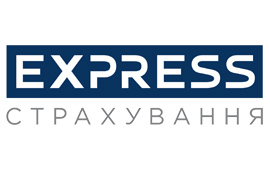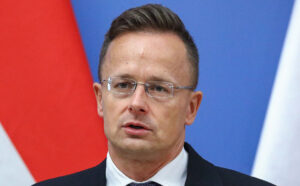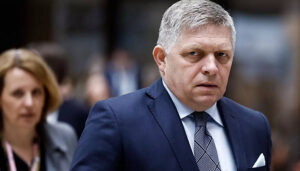
Ukraine has won the Panorama section of the Berlinale for the first time — the film Traces received the Audience Award at the 76th festival, according to Deputy Prime Minister for Humanitarian Policy and Minister of Culture of Ukraine Tetiana Berezhna.
Ukraine won the Berlinale Panorama award for the first time — the film “Traces” received the audience award at the 76th festival.
“The world has heard Ukrainian women. Thank you to them for their strength and courage to talk about the most painful things,” Berezhna wrote on Facebook on Saturday.
According to her, the film “Traces” by directors Alisa Kovalenko and Marisa Nikityuk received the award in the Panorama Dokumente category based on the results of a vote by 26,500 viewers.
“Traces” tells the stories of Ukrainian women who survived sexual violence during the Russian aggression and decided to testify. Therefore, it is especially valuable that the award is the choice of the audience, a living response to the truth that cannot be ignored.
According to the UN, more than 90% of Ukrainian military and civilians who were held captive by Russia reported torture and inhumane treatment. Sexual violence is used as a weapon of war and remains one of the most silenced crimes. Traces breaks this silence, the deputy prime minister noted.
Director Alisa Kovalenko personally experienced sexual violence while in captivity in Donbas at the beginning of the war. She was one of the first women in Ukraine to speak publicly about this experience, and her story was the impetus for the film, Berezhnaya said.

In 2025, Express Insurance collected UAH 1.257 billion in insurance premiums, which is 34.8% more than in 2024.
According to the insurer’s website, auto insurance products traditionally accounted for the largest share of annual premiums.
Thus, the volume of premiums under CASCO contracts in 2025 increased by 12.9% and amounted to UAH 817.1 million, reflecting stable demand for comprehensive vehicle protection programs. Premiums for compulsory motor third-party liability insurance increased by 125.4% to UAH 415.6 million.
Express Insurance LLC was founded in 2008 with the participation of the leader of the Ukrainian automotive market, UkrAuto Group. It specializes in auto insurance.
The company is represented in more than 60 points of sale throughout Ukraine and is actively expanding its network of partner service stations. Today, the number of service station partners exceeds 100.

Hungary has decided to block the allocation of a EUR90 billion EU loan to Ukraine until oil transit to Hungary via the Druzhba pipeline is resumed, Hungarian Foreign Minister Péter Szijjártó said.
On Friday evening, he again accused Ukraine on social media of allegedly blackmailing Hungary by stopping oil transit in coordination with Brussels and the Hungarian opposition in order to create supply disruptions in Hungary and raise fuel prices ahead of the elections.
According to Szijjártó, Ukraine is violating the Association Agreement with the EU.
As reported with reference to Ukrtransnafta, as a result of a targeted Russian attack on January 27, significant damage was caused to the technological and auxiliary equipment of the Druzhba oil pipeline.
“Currently, work is underway at various stages to detect defects, stabilize the technical condition of the system, and eliminate the consequences of the hostile attack. Emergency repair work is being carried out with the involvement of specialized technical units and specialized equipment,” the company said in an official comment to Interfax-Ukraine on February 19.
Hungary and Slovakia stopped supplying diesel fuel to Ukraine on February 18 until the transit of Russian oil through the Druzhba pipeline is restored.
The European Commission, in turn, convened a meeting of the oil coordination group on February 25 in connection with the suspension of supplies to Hungary and Slovakia due to Russia’s damage to the Druzhba oil pipeline.

Slovak Prime Minister Robert Fico has announced his intention to stop emergency electricity supplies to Ukraine if Ukraine does not resume oil supplies on Monday, February 23, which were interrupted after an accident on the Druzhba oil pipeline near the Ukrainian city of Brody in the Lviv region in January.
“If the Ukrainian president does not resume oil supplies to Slovakia on Monday, then on the same day I will ask the relevant Slovak companies to stop emergency electricity supplies to Ukraine,” Fico wrote on Twitter.
He also accused Ukrainian President Volodymyr Zelensky of allegedly “refusing to understand our peacemaking approach” and therefore, according to Fico, “behaving maliciously towards Slovakia,” which he believes treats Slovakia “as an enemy country.”
“First, he stopped gas supplies to Slovakia, causing us losses of €500 million a year. Now he has stopped oil supplies, causing us further losses and logistical difficulties. If the West does not object to the Nord Stream gas pipeline being blown up, Slovakia cannot view Slovak-Ukrainian relations as a one-way ticket that is only beneficial to Ukraine,” the Slovak prime minister wrote.
Fico added that he is a “proud and sovereign Slovak” and intends to ask the state-owned joint-stock company SEPS to stop emergency electricity supplies to Ukraine. “In January 2026 alone, these emergency supplies, necessary to stabilize the Ukrainian power grid, were twice as much as in the whole of 2025,” he said.
The head of the Slovak government also stressed that Slovakia has been helping Ukraine since the beginning of the war. “About 180,000 Ukrainians are currently on our territory, we are providing humanitarian aid and organizing joint government meetings. We are doing much more for Ukraine than some other countries,” Fico wrote.
As reported, on February 18, the export of diesel fuel from Hungary to Ukraine was suspended until the resumption of Russian crude oil transit through the Druzhba pipeline, said Hungarian State Secretary for Public Diplomacy and Public Relations Zoltán Kovács. In his opinion, Ukraine “unilaterally stopped supplies on January 27 for purely political reasons, although technically their resumption is possible.” Statements about the suspension of diesel exports to Ukraine also came from the Slovak side.
Earlier, Hungary and Slovakia asked Croatia to allow Russian oil to be supplied to Hungary and Slovakia via the Adria pipeline. Meanwhile, Slovakia has declared a state of emergency in the oil industry due to the lack of oil supplies.
Croatian Economy Minister Ante Šušnjar, in turn, said that the Adria pipeline is ready for operation, but that there are no technical justifications for any EU country to remain tied to Russian crude oil. “A barrel bought from Russia may seem cheaper for some countries, but it helps finance the war and attacks on the Ukrainian people,” he said.
The transport of Russian crude oil through Ukraine via the Druzhba pipeline has been halted since the end of last month due to large-scale Russian attacks on Ukrainian energy infrastructure.

According to Fixygen, Poltava Assembly and Preparation Plant JSC plans to hold a general meeting of shareholders on March 13, 2026.
Key voting topics include annual corporate governance issues: review and approval of annual results, financial statements, as well as decisions on the distribution of operating results and possible approval of significant transactions.
Poltava Assembly and Fabrication Plant JSC is a Poltava-based company operating in the field of fabrication and assembly work/production services for industry.
assembly and fabrication plant, POLTAVA, shareholders' meeting